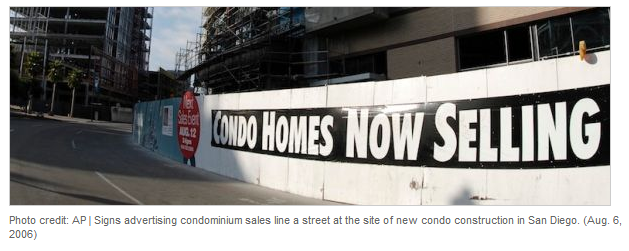
By BONNIE BIAFORE
Condo prices are so depressed you may be able to afford a home that was far beyond your means before the recession.
Luxurious properties in the heart of the city, or overlooking the ocean, fairway or mountain, cost hundreds of thousands of dollars less than they did just a few years ago.
But buying the right condo means you have to do more than choose a good location and pay the right price.
Your fortunes and living space are intimately linked with those of the other owners and the homeowners’ association.
You also have to take into account homeowners’ fees, additional assessments and the overall financial health of the condominium complex.
These five smart moves can help you choose the right condo with confidence.

You stand to get the cheapest possible loan if you can qualify for a mortgage guaranteed by theFederal Housing Administration.
Everything from the lowest possible down payment to closing costs is possible.
FHA loans are also designed to help home buyers who have more debt, lower credit scores and less cash for a down payment than traditional mortgages require.
But the building or complex must be approved by the FHA before it will finance a condo there, and only about 25% of condo complexes are FHA-approved.
To be FHA-approved, existing complexes must have:
Hazard and liability insurance.
Half of all units sold or under contract as a primary or second home. No more than 10% of the units can be owned by one investor (or the builder or developer).
No more than 25% of the total floor space devoted to commercial uses.
No more than 15% of all units more than 30 days past-due on their condo association payments.
You can search for FHA-approved condos using the Department of Housing and Urban Development’s condominium search feature.
“Even if a condo complex doesn’t have FHA approval, savvy buyers can use FHA standards to evaluate the quality, financial security and resale prospects of a condo complex,†says Sheryl Petrashek, a Realtor for Re/MAX Results in Apple Valley, Minn.
Smart move 2. The next best loan is backed by Fannie Mae.
If you won’t need a jumbo loan — one for more than $417,000 to $729,750, depending on the city — you’ll want to finance your purchase with another type of government-backed loan.
You’ll want a loan that can be sold to Fannie Mae, one of the big government agencies that buy mortgages from banks and mortgage companies.
That will make it easier for you to qualify for a mortgage and help you get the lowest possible interest rate.
But 51% of the units in the building or complex must be owner-occupied (as opposed to investor-owned and rented) to qualify for Fannie Mae financing.
In addition, Fannie Mae requires that at least 10% of association dues be deposited in the condo association’s reserves.
If you are making a down payment of less than 20% and must have mortgage insurance, the investor ownership has to be less than 30%.
For condos in newly constructed buildings, Fannie Mae requires that more than 50% of the units must be sold or under contract as a primary or second home.
To obtain mortgage insurance, 70% must be sold with no more 30% owned by investors.
Smart move 3. Check for healthy financial reserves.
When you own a condo, you pay homeowners’ association fees to cover maintenance and operating expenses for the entire complex.
The condo association should have reserves to cover two to three years of its operating budget.
Less than that, and you might have to pay additional assessments or increased dues for large projects like a new roof. If the reserves are higher than that, you could be paying higher monthly dues than necessary.
Check the number of foreclosures in the complex.
Besides reducing property values, foreclosed units don’t contribute to the association’s reserves, so some homeowner associations make the remaining owners pay higher fees to recoup those losses.
Smart move 4. Beware of potential special assessments.
The condo association’s reserves cover operating costs and maintenance.
But if the association defers maintenance or doesn’t collect enough in fees, it will have to charge a special one-time assessment to pay for big projects like new landscaping or replacing decks.
“Many condo buildings in Florida didn’t collect reserves for many years,” says Janice Leis, associate broker with Prudential Fox & Roach in Philadelphia. “When hurricanes compromised the structures and insurance companies mandated upgrades, condo owners faced special assessments from $30,000 to $100,000, depending on the unit.â€
Start by looking at the exterior of the buildings and the grounds for warning signs of disrepair.
The condo board minutes should include plans for major projects and whether they will require an assessment.
The association’s financial statements show the projects that have been done in the past. You can see the major work that’s been done.
You can also ask yourself whether you would have agreed to those projects if you had been an owner. If you wouldn’t have, you might not approve of the projects that come up in the future.
In addition, ask the condo association about the age of items, such as the roof, elevators, air conditioning system, heating system, security, windows and so on, and when they may need to be replaced.
Some condo associations put together multiyear plans so they can plan for big projects without assessing large one-time fees.
A home inspector, besides checking out your condo, can also identify potential maintenance issues for the complex.
Smart move 5. Look for a smooth-running organization.
Look through the condo board meeting minutes to see if problems are resolved quickly and effectively.
Taking care of maintenance issues is one of the board’s essential responsibilities.
Any repair should show up in the notes twice: first, when the board discusses it and decides what to do, and again when the bill is paid and the issue is resolved.
Maintenance issues reappearing month after month are a sign of an ineffective or even dysfunctional board.
Talk to people who live in the building. Find out if their needs are met and issues resolved in a reasonable amount of time.
Neighbors can also provide an idea of the character of the complex.
Condos are close quarters, so issues such as noise, pets and untidy habits can become unbearable.
Published by